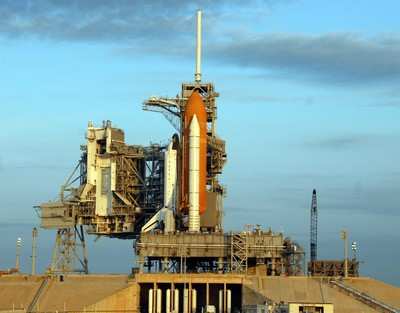Thu, Apr 28, 2011
Full HD Images Will Improve Medical Documentation, Facilitate
Station Operation And Maintenance
The U.S. space shuttle Endeavour, scheduled for launch on April
29 will transport a new HD video camera to the International Space
Station (ISS). The first full HD video camera, designed and built
by Astrium for the ISS on behalf of ESA, was delivered in eight
months. At the end of 2010, a fully qualified and tested prototype
of the High Definition Video Camera Assembly (HD-VCA), including
the interface unit, was delivered by ESA/Astrium to NASA for upload
with this so called mission ULF-6 56 (Utilization and Logistics
Flight). The camera has a design life of ten years and is intended
to replace one of the existing system cameras on board the Columbus
module.

There are a multitude of possible uses for high-quality moving
images from on board the ISS that remain crisp and sharp even on
large displays or projection screens. They can provide doctors with
high-resolution documentation for detailed case histories or can
serve as a precision tool for specialists who need to analyse
in-orbit hardware and processes when providing technical ground
support. Moreover it gives the general public on Earth genuine
insights into events in orbit. The product also has potential for
commercial exploitation: the HD camera could in future be set up to
film through a window while the astronauts are asleep, enabling it
to transmit live images of Earth back to the ground station.
To achieve the very short time to orbit for the HD-VCA project,
Astrium processed multiple aspects of each phase in parallel, from
development through to testing, qualification, and the work on
prototype devices. Close cooperation was maintained with ESA
throughout. The specifications for the HD video camera for the ISS
included employing as many off-the-shelf components as possible,
while at the same time limiting or preferably avoiding the risks
associated with the use of such components in space. Astrium's
solution was the HD-VCA Box which fits underneath the actual HD
camcorder. It serves as an interface enabling the HD camera to
operate on power supplied by the Columbus laboratory's on-board
network, and also converts the data recorded by the HD camera into
a format that the systems on-board Columbus can read, process and
downlink.
More News
19-Year-Old Pilot Was Attempting to Fly Solo to All Seven Continents On his journey to become the first pilot to land solo on all seven continents, 19-year-old Ethan Guo has hit a >[...]
From 2017 (YouTube Edition): A Quality LSA For Well Under $100k… Aeroprakt unveiled its new LSA at the Deland Sport Aviation Showcase in November. Dennis Long, U.S. Importer>[...]
Hazardous Weather Information Summary of significant meteorological information (SIGMET/WS), convective significant meteorological information (convective SIGMET/WST), urgent pilot>[...]
Aero Linx: Historic Aircraft Association (HAA) The Historic Aircraft Association (HAA) was founded in 1979 with the aim of furthering the safe flying of historic aircraft in the UK>[...]
"We would like to remember Liam not just for the way he left this world, but for how he lived in it... Liam was fearless, not necessarily because he wasn't afraid but because he re>[...]
 TikToker Arrested After Landing His C182 in Antarctica
TikToker Arrested After Landing His C182 in Antarctica Classic Aero-TV: Versatile AND Practical - The All-Seeing Aeroprakt A-22 LSA
Classic Aero-TV: Versatile AND Practical - The All-Seeing Aeroprakt A-22 LSA ANN's Daily Aero-Term (06.27.25): Hazardous Weather Information
ANN's Daily Aero-Term (06.27.25): Hazardous Weather Information ANN's Daily Aero-Linx (06.27.25)
ANN's Daily Aero-Linx (06.27.25) Aero-News: Quote of the Day (06.27.25)
Aero-News: Quote of the Day (06.27.25)



